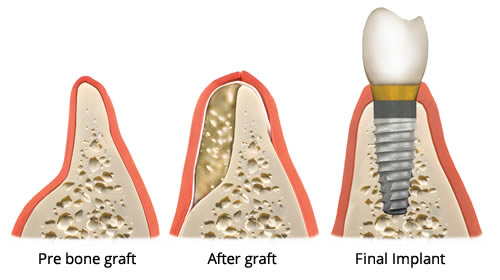Bone Health For Successful Dental Implants

Why the condition of your jawbone is important for implant placement.
Nobody plans to have dental implants whilst they have a healthy and full set of teeth.
But as we know, this may not last forever and tooth loss may occur either naturally or as a result of an accident. In this case replacing your tooth with a dental implant will be easier if your jawbone is generally strong and healthy.
In addition to ensuring that the jaw is suitable for dental implants, should you need them, a strong jaw bone also helps with talking and chewing food too. Some factors which cause bone loss in the jaw may also affect other bones in your body, so an overall approach to good bone health is likely to be generally beneficial to the health of your body.
What causes bone loss?
It is well established that we need a sufficient intake of calcium to keep our bones strong and healthy and this is readily available in dairy products. For those who don’t consume dairy products, such as vegans, an alternative source should be sought.
In addition to calcium, there are two important vitamins that help to keep bones strong. These are vitamin K2 and vitamin D. Vitamin K2 can be obtained through sources such as liver, eggs and some cheeses, whilst vitamin D can be obtained through sufficient exposure to sunlight and is also found in cereals, orange juice and tuna, amongst other foods. The vitamin D also helps the absorption of vitamin K2. Generally, if you eat a healthy diet, you should not need to take supplements, but you may wish to discuss this further with your GP.
You should also make sure to take a reasonable amount of exercise. Not only will this help to prevent bone loss, but, in the eventuality of having a dental implant placed at our Ipswich dental practice, the improved blood flow will help to speed up the healing process.
As we have mentioned in previous Foxhall Dental Practice blogs, smoking and excessive consumption of alcohol are also factors that can have a negative effect on the health of your jawbone, so stopping or reducing these habits will also be very beneficial.
What if it’s too late?
If you do need to have a dental implant, but the bone in the jaw is insufficient to place it into, all is not lost and a bone graft can be used to build up the bone structure to a sufficient density. This does add extra time onto the procedure though, so if you can keep your bones healthy and strong in the first place, the implant process will be that much shorter.
If you have a missing tooth and would like to discuss the possibility of having an implant to replace it, why not arrange a consultation with us by calling the Foxhall Dental Practice today on 01473 258396.
